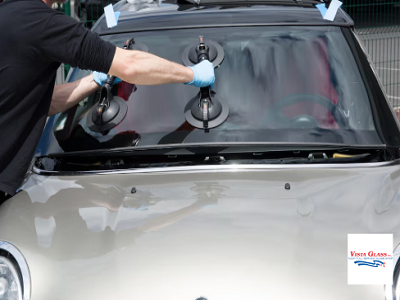Windshield cracks are a common issue faced by drivers in Tucson due to various environmental and driving conditions. One of the primary causes of windshield damage in this region is the extreme temperature fluctuations. During the hot summer months, the intense sun can cause the glass to expand, while the cooler nights lead to contraction, creating stress that can result in cracks.
Additionally, driving on rough or gravel roads can cause stones or debris to strike the windshield, leading to chips and fractures. When left unaddressed, these small damages can quickly escalate into larger cracks, compromising the safety and visibility of the driver. Windshield repair is essential to prevent further damage and ensure the durability of the vehicle’s glass.
Temperature Extremes and Their Impact
Tucson’s extreme temperature fluctuations present a significant challenge for vehicle windshields. During the hot summer months, temperatures can soar well above 100°F, which causes the glass to expand. As the sun sets and nighttime temperatures drop, the glass contracts. This continuous cycle of expansion and contraction can weaken the windshield over time, causing micro-stresses that develop into cracks or chips.
The dry desert air only exacerbates this issue, leading to more rapid degradation of the glass. Over time, even minor temperature-induced stress can result in the formation of cracks, especially if the windshield is already compromised. To protect your windshield from this kind of damage, regular inspection and timely windshield repair are essential. If a crack or chip develops due to temperature changes, addressing it quickly can prevent further damage and extend the lifespan of your windshield.
Road Debris and the Risk of Windshield Damage
In Tucson, driving through areas with loose gravel, dirt roads, or areas prone to debris is a common cause of windshield damage. Rocks, pebbles, or branches can easily be kicked up by the tires of other vehicles and strike your windshield with considerable force, causing small chips that may quickly turn into larger cracks. This kind of damage is particularly concerning when driving at high speeds on highways or rural roads.
Even minor debris impacts can compromise the integrity of the windshield, leading to costly repairs or replacements if not addressed promptly. While it’s impossible to avoid all debris, maintaining a safe distance from other vehicles and being vigilant about road conditions can help reduce the risk. If debris does strike your windshield, prompt windshield repair can prevent the damage from spreading and ensure your glass stays intact.

Improper Installation Leading to Cracks
One often overlooked cause of windshield cracks is improper installation. When a windshield is not correctly installed, it may be misaligned or not properly sealed, creating uneven pressure on the glass. Over time, this pressure can cause stress fractures, particularly in areas where the glass is weakest. In addition to misalignment, improperly applied adhesives or seals can cause leaks, allowing moisture to seep into the windshield, which weakens the glass structure and makes it more vulnerable to cracks. It’s crucial to ensure that your windshield is installed by professionals with the right skills and tools.
If you’ve recently had your windshield replaced and notice issues such as wind noise, water leakage, or visible gaps, it may be a sign that the installation was not done properly, and you should seek repair services immediately.
Vehicle Age and the Degradation of Windshield Materials
As vehicles age, their windshields may become more susceptible to damage. Over time, the materials that make up the windshield—such as the adhesive that bonds it to the frame or the windshield’s own glass—can deteriorate. UV rays, dirt, and pollutants can weaken these materials, making it more likely for cracks and chips to appear. Additionally, older windshields may have accumulated small imperfections over time that, while not immediately noticeable, can affect the strength of the glass.
This degradation process accelerates if the vehicle is left in direct sunlight for extended periods or if the windshield is subjected to harsh environmental conditions. For older vehicles, regular inspection of the windshield is important. Addressing small issues before they turn into bigger problems can save you the cost of a full replacement and help you avoid more significant safety risks on the road.
Poor Driving Habits Contributing to Windshield Stress
Driving habits can have a major impact on the lifespan of your windshield. Sudden, hard braking or abrupt acceleration causes vibrations throughout the vehicle, which can place undue stress on the windshield, particularly if there are already small chips or cracks present. Additionally, hitting curbs, potholes, or uneven surfaces at high speeds can cause the windshield to flex and may lead to stress fractures.
Driving too close to large trucks or construction vehicles increases the chances of flying debris striking the windshield, causing chips or cracks. Smooth, controlled driving can minimize these stresses, preventing unnecessary wear and tear on your windshield. If you do encounter any damage, it’s essential to seek windshield repair as soon as possible. The longer you wait, the more likely the damage will spread, requiring a more expensive replacement.
Chemical Contaminants Affecting Windshield Strength
Tucson’s environment is home to a variety of contaminants that can affect your vehicle’s windshield. For example, bird droppings, tree sap, and insect remains are common sources of damage. These substances can contain acidic properties that, when left on the glass, begin to eat away at the surface, leading to staining or weakening of the glass. Pollutants and chemicals found in the air, such as those from nearby construction sites or industrial areas, can also degrade the windshield’s protective coating over time.
Additionally, harsh cleaning products or abrasive materials used to clean the windshield can scratch or damage the glass, exacerbating existing weaknesses. Regular cleaning using the right products and techniques can help protect your windshield from these damaging effects. If any contaminants have caused damage, seeking windshield repair can help restore the glass and maintain its structural integrity.
How Natural Elements in Tucson Contribute to Cracks
Tucson’s natural environment is a key factor in the frequent occurrence of windshield cracks. The city’s dry conditions, frequent dust storms, and seasonal monsoon rains can all lead to damage. Dust and debris blown by strong winds can cause abrasions on the windshield, particularly if left untreated. In the monsoon season, heavy rainfall can infiltrate even small cracks, causing them to expand quickly due to the force of the water.
These elements, combined with Tucson’s extreme temperatures, make windshields especially vulnerable to damage. Regular windshield maintenance and repairs are crucial to keeping your vehicle’s glass in top condition. Taking proactive steps to address any damage promptly can help prevent costly replacements and keep you safe while driving in Tucson’s challenging climate.
Conclusion
Windshield cracks in Tucson can stem from a variety of factors such as temperature extremes, road debris, improper installation, and the natural environment. Understanding these common causes can help you take preventive measures and respond quickly to any damage. Whether it’s protecting your windshield from debris, adopting better driving habits, or addressing cracks early, proper maintenance is key.
At Vista Glass in Tucson, we specialize in providing professional windshield repair services to help you maintain the safety and durability of your vehicle’s glass. Don’t wait for small chips to turn into dangerous cracks—contact Vista Glass today for fast, reliable windshield repair! Our expert technicians are here to ensure your windshield is as safe and clear as possible, no matter the conditions.

